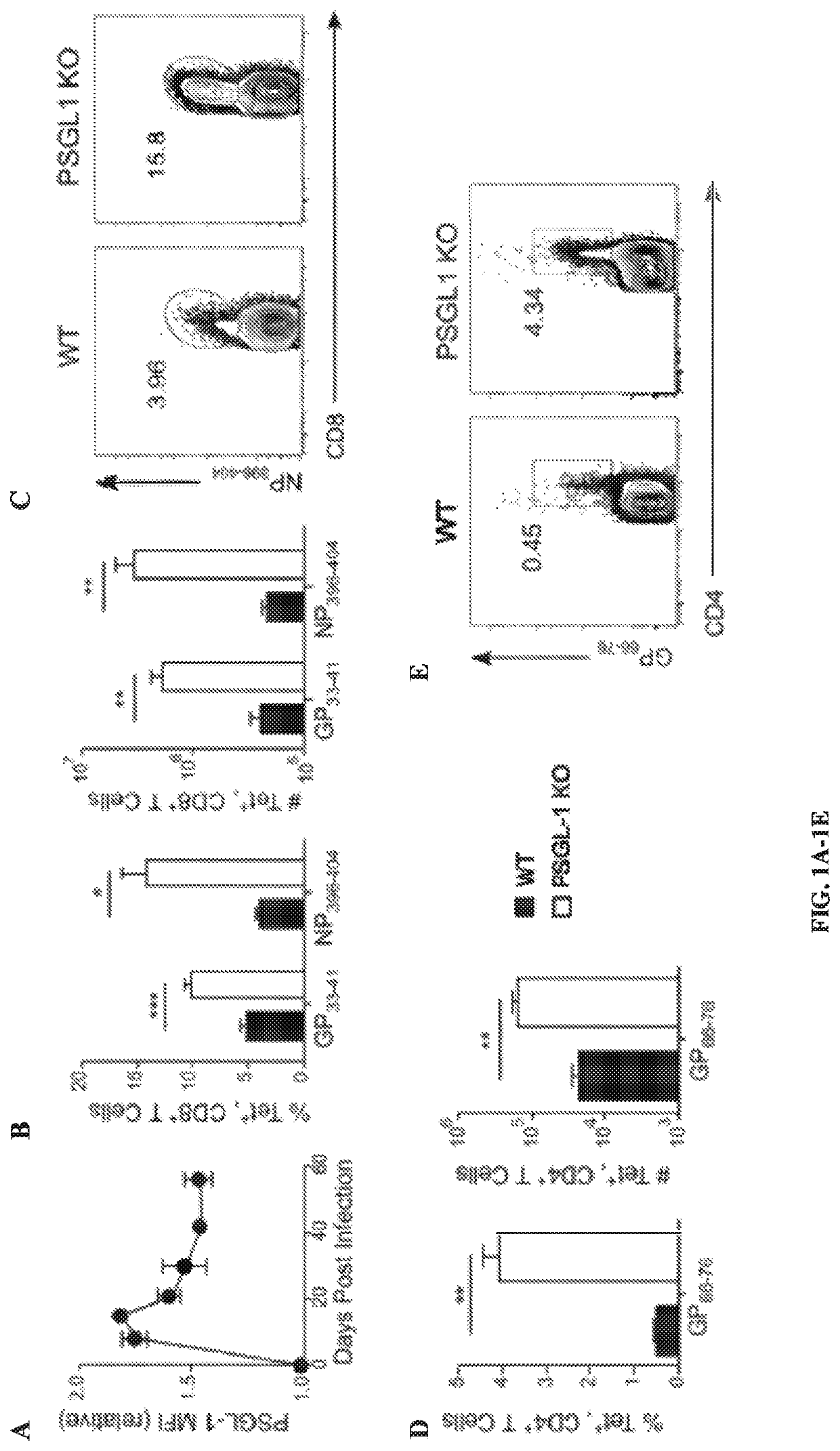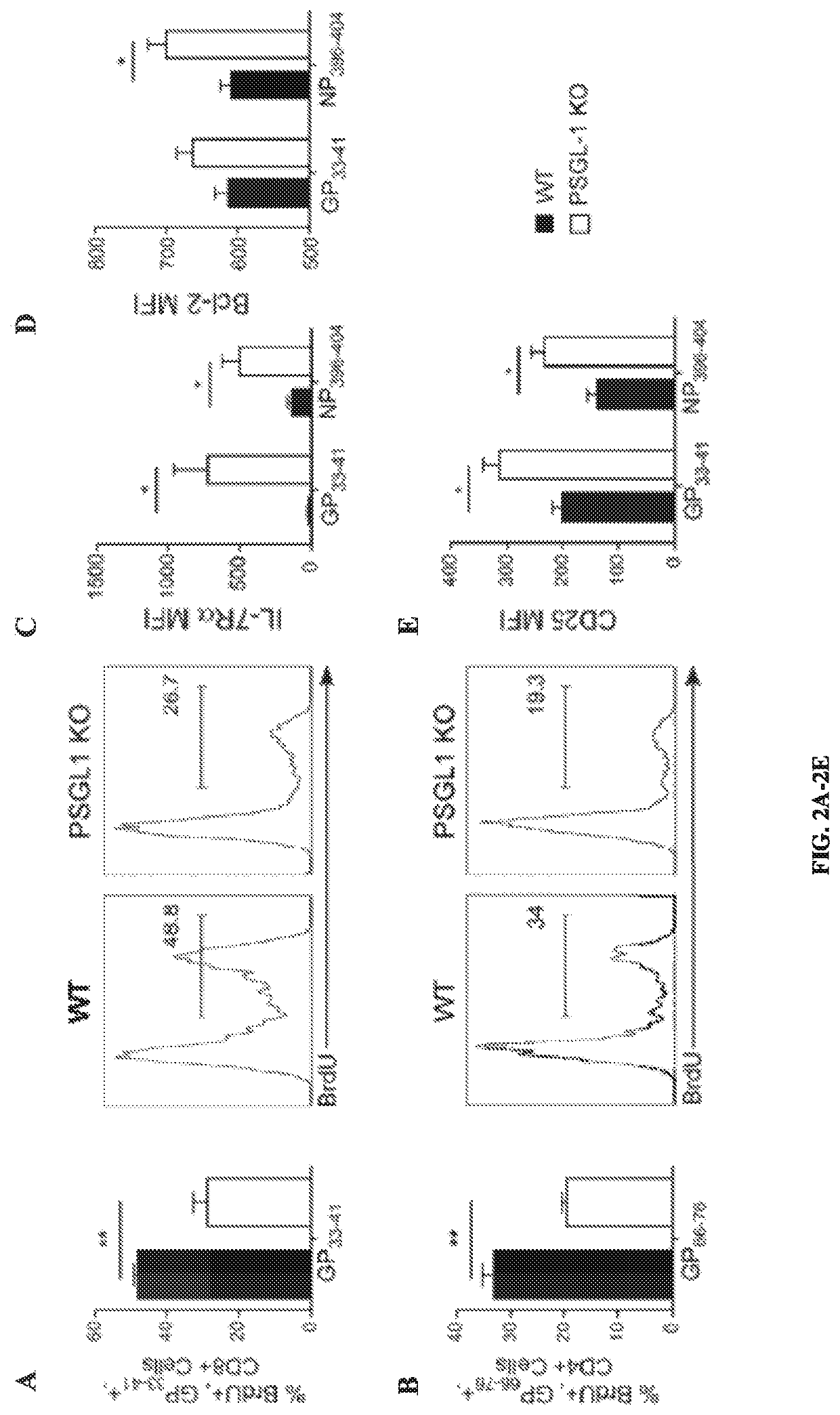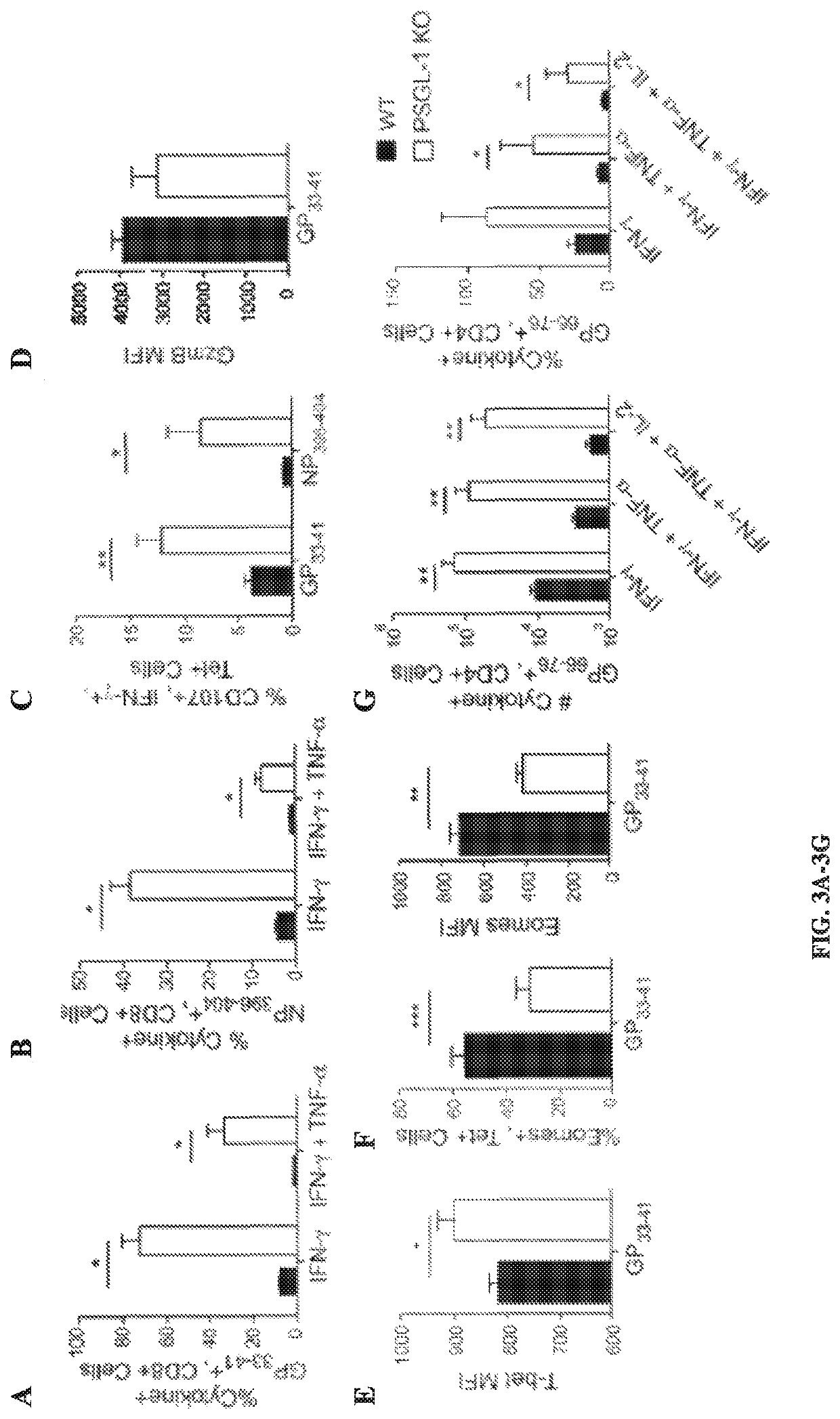PSGL-1 modulators and uses thereof
a technology of pselectin glycoprotein and modulator, which is applied in the field of antibodies, can solve the problems of chronic infection dysfunction and limited efficacy to a subset of patients (often 30%), and achieve the effect of increasing the survival rate of multifunctional t cells
- Summary
- Abstract
- Description
- Claims
- Application Information
AI Technical Summary
Benefits of technology
Problems solved by technology
Method used
Image
Examples
example 1
PSGL-1 Expression is Increased on Virus-Specific CD8+ T Cells and PSGL-1 Deficient Mice have an Accumulation of Virus-Specific T Cells During Cl13 Infection
[0090]To study PSGL-1 in chronic viral infection, the LCMV Cl13 virus was used which results in viremia to 90-dpi and detectable virus in brain and kidney to 200-days post infection (dpi). PSGL-I levels on CD8+ T cells specific for the GP33-41+ LCMV epitope was first examined by tetramer staining. Although. PSGL-1 is expressed by all T cells, the levels were increased on virus-specific compared to naïve CD8+ T cells (FIG. 1a). To examine contributions of PSGL-1 to the anti-viral response, WT or PSGL-1-deficient mice were infected with Cl13 and analyzed CD8+ T cells specific for the LCMV GP33-41+ and NP396-404+ epitopes. PSGL-1-deficient mice had greatly increased frequencies and numbers of GP33-41+CD8+ T cells at 8-dpi (FIG. 1b). The difference in CD8+ T cell accumulation was not observed until after 4-dpi (FIG. 8a-b) and tetrame...
example 2
PSGL-1-Deficient CD8+ T Cells have Enhanced Survival
[0092]Enhanced proliferation and / or survival could account for the accumulation of virus-specific T cells in PSGL-1-deficient mice. To assess proliferation, in vivo BrdU incorporation by virus-specific CD8+ T cells was analyzed at 8-dpi. BrdU labeled −50% of WT GP33-41+CD8+ T cells, but only −25% PSGL-1-deficient GP33-41+CD8+ T cells (FIG. 2a). Similarly, 2× more WT GP66-76 CD4+ T cells incorporated BrdU than PSGL-1-deficient CD4+ virus-specific cells (FIG. 2b). Since division did not seem to account for greater numbers of PSGL-1-deficient CD8+ T cells, the expression levels of the survival molecules, IL-7Rα and its downstream signaling target Bcl-2 by CD8+ effector cells was examined. At 10-dpi both GP33-41+ and NP396-404+ T cells from PSGL-1-deficient mice displayed increased levels of IL-7Rα (FIG. 2c) and Bcl-2 (FIG. 2d) compared to WT cells. Furthermore, IL-7Rα levels on PSGL-1-deficient virus-specific CD8+ T cells were higher ...
example 3
Virus-Specific CD4+ and CD8+ T Cells in PSGL-1-Deficient Mice are Multifunctional Effectors
[0093]Since chronic virus infection in WT mice leads to sequential loss of the CD8+ T cell capacity to produce IFN-γ, TNF-α, and IL-2, as well as to produce more than one of these cytokines simultaneously, cytokine production was examined. Much higher frequencies of PSGL-1-deficient GP33-41+ T cells secreting IFNγ and IFN-γ+TNF-α together were found compared to WT cells (FIG. 3a). NP396-404+ T cell responses were also functional (FIG. 3b). On a per cell basis, −10% of GP33-41+ T cells produced IFN-γ in WT vs −70% in PSGL-1-deficient mice (FIG. 3a). Furthermore, virus-specific PSGL-1-deficient CD8+ T cells produced significantly higher levels of cytokines (FIG. 11a,b). Both GP33-41+ and NP396-404+ PSGL-1-deficient CD8+ T cells had enhanced CD107a levels, indicating better cytotoxic degranulation, together with IFN-γ section (FIG. 3c), although WT and PSGL-1-deficient GP33-41+CD8+ T cells did no...
PUM
| Property | Measurement | Unit |
|---|---|---|
| size | aaaaa | aaaaa |
| molecular weight | aaaaa | aaaaa |
| temperature | aaaaa | aaaaa |
Abstract
Description
Claims
Application Information
 Login to View More
Login to View More - R&D
- Intellectual Property
- Life Sciences
- Materials
- Tech Scout
- Unparalleled Data Quality
- Higher Quality Content
- 60% Fewer Hallucinations
Browse by: Latest US Patents, China's latest patents, Technical Efficacy Thesaurus, Application Domain, Technology Topic, Popular Technical Reports.
© 2025 PatSnap. All rights reserved.Legal|Privacy policy|Modern Slavery Act Transparency Statement|Sitemap|About US| Contact US: help@patsnap.com



